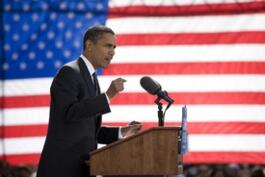More Voters See Need for U.S. To Be World's Top Cop
In his first major foreign policy speech since announcing his run for president, Senator Marco Rubio of Florida echoed the views of some of his Republican competitors that America must renew its military and moral leadership but stopped short of saying it should be the world’s policeman. More voters than ever think the U.S. military is overstretched these days, but slightly more also think America has a responsibility to maintain order globally.
A new Rasmussen Reports national telephone survey finds that 56% of Likely U.S. Voters believe the U.S. military is overstretched, up five points from earlier this year. Just 27% now think America’s armed forces can adequately handle the number of missions it has. That’s down from a high of 33% in January. Seventeen percent (17%) are undecided. (To see survey question wording, click here.)
Seventy-one percent (71%) agree with former President Ronald Reagan that “the United States should not commit its forces to military action overseas unless the cause is vital to our national interest.” Just 15% disagree, and 13% are undecided. Views on this question have changed little since we first asked it three years ago.
At the same time, 20% now believe the United States should be the world’s policeman. That’s up from 17% earlier this year and is the highest level measured in nearly six years. This finding remained at 11% or 12% from 2009 through 2013. However, seven-out-of-10 voters (68%) still disagree, while 12% are not sure.
Fifty-one percent (51%) of voters say our political leaders send the nation’s soldiers into harm’s way too often, though that’s down from 53% earlier this year and a high of 60% a year ago. Just 12% say our leaders don’t use the military enough. Twenty-eight percent (28%) think the balance is about right.
However, just 25% believe the United States and its allies are winning the War on Terror. That’s down from 29% last month but is still slightly above the all-time low of 19% measured in February. Now 37% think the terrorists are winning, a finding that reached an all-time high of 39% last month. Thirty percent (30%) say neither side has the advantage.
Confidence in U.S. anti-terrorism efforts hit a high of 62% in February 2009 just after President Obama’s inauguration, then steadily deteriorated until the killing of Osama bin Laden in May 2011 when it rebounded into the 50s. But it had been trending down for the past two years.
(Want a free daily e-mail update? If it's in the news, it's in our polls). Rasmussen Reports updates are also available on Twitter or Facebook.
The national survey of 1,000 Likely Voters was conducted on May 13-14, 2015 by Rasmussen Reports. The margin of sampling error is +/- 3 percentage points with a 95% level of confidence. Field work for all Rasmussen Reports surveys is conducted by Pulse Opinion Research, LLC. See methodology.
Congress and the president are battling over a federal budget that spends more on the military, but voters are less gung-ho about increasing defense spending than they were three months ago. Still, support for more spending on defense remains higher than it has been in several years.
Perhaps some of this higher support for more defense spending can be attributed to the fact that confidence that the homeland is safer than it was before the September 11, 2001 terrorist attacks is at its lowest level in five years. Following the abortive terrorist attack in Texas recently, most Americans agree that Islamic terrorism is now a bigger threat inside the United States.
Most voters still agree across nearly very demographic category that the United States should not be the world's policeman.
Twenty-nine percent (29%) of Republicans believe the United States has that responsibility, but only 14% of Democrats and 18% of voters not affiliated with either major party agree. While Republicans are far less likely than the others to believe politicians send the military into harm's way too often, they are also more likely to think that military is currently overstretched.
Men are more likely than women to believe America should be the world’s policeman.
Seventy percent (70%) of voters who think the United States should not have invaded Iraq back in 2003 believe political leaders put American soldiers into harm's way too often, a view shared by just 31% of those who support that decision based on intelligence information at the time. Thirty-four percent (34%) who supported the U.S. invasion think this country should be the world’s policeman; just nine percent (9%) of voters who oppose the decision agree.
We will release new findings on voters’ views on the Iraq invasion and how the issue might affect the 2016 presidential race at 10:30 a.m. Eastern today.
Voters tend to believe the radical Islamic State group (ISIS) is winning the war in Iraq but are much less supportive of putting U.S. combat troops in the fight.
One-out-of-two voters (49%) believe U.S. government policies in the last five years have hurt America’s relations with most other countries.
Additional information from this survey and a full demographic breakdown are available to Platinum Members only.
Please sign up for the Rasmussen Reports daily e-mail update (it’s free) or follow us on Twitter or Facebook. Let us keep you up to date with the latest public opinion news.
The national survey of 1,000 Likely Voters was conducted on May 13-14, 2015 by Rasmussen Reports. The margin of sampling error is +/- 3 percentage points with a 95% level of confidence. Field work for all Rasmussen Reports surveys is conducted by Pulse Opinion Research, LLC. See methodology.
Rasmussen Reports is a media company specializing in the collection, publication and distribution of public opinion information.
We conduct public opinion polls on a variety of topics to inform our audience on events in the news and other topics of interest. To ensure editorial control and independence, we pay for the polls ourselves and generate revenue through the sale of subscriptions, sponsorships, and advertising. Nightly polling on politics, business and lifestyle topics provides the content to update the Rasmussen Reports web site many times each day. If it's in the news, it's in our polls. Additionally, the data drives a daily update newsletter and various media outlets across the country.
Some information, including the Rasmussen Reports daily Presidential Tracking Poll and commentaries are available for free to the general public. Subscriptions are available for $4.95 a month or 34.95 a year that provide subscribers with exclusive access to more than 20 stories per week on upcoming elections, consumer confidence, and issues that affect us all. For those who are really into the numbers, Platinum Members can review demographic crosstabs and a full history of our data.
To learn more about our methodology, click here.





